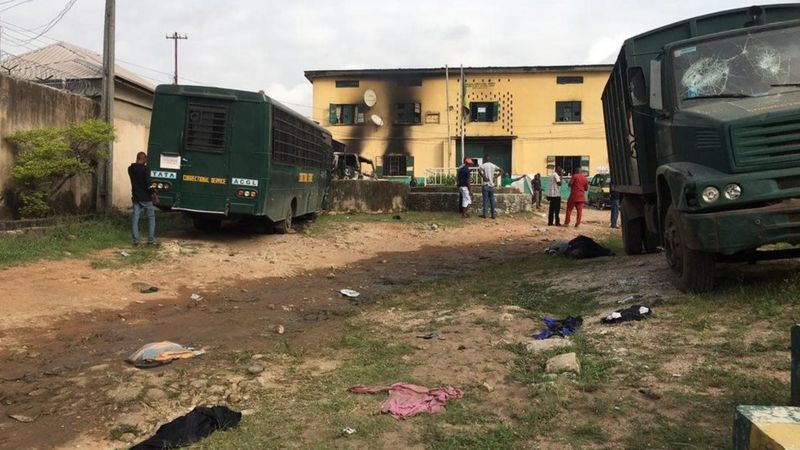
Nigeria seeking solutions to decrepit, porous colonial prisons
Mohammed Momoh
Abuja, November 11, 2021 : Although he had been re-arrested after jailbreak in 2020, but not after the havoc had been done. One of the 1,729 inmates that escaped from the two Correctional Centres in Nigeria’s South South Edo state, trailed and killed the judge and the prosecutor that threw him into jail.
“Some of the escaped inmates from Edo state have been rearrested for murder, another crime.
“There was a particular case that immediately he escaped from the centre in Edo, he went straight and killed all those he said facilitated his initial arrest.
Luckily he has now been arrested and faces a double jeopardy, one for escape from lawful custody and two, for murder”, Mr Rauf Aregbesola, Nigerian Interior Minister reported.
The jailbreaks in the two Correctional Centres on October 19, 2021 in the wake of the national protests against the brutality of the police’s Special Anti-Robbery Squad (SARS), unleashed notorious criminals into the society.
Aside the ugly killing of the judge and the prosecutor caused by jailbreak, the lack of diligence in securing the prisons and the poor management of inmates, especially record keeping have compounded the trouble of the system in Nigeria.
In one year (October 2020 to October 2021) there had been eight attacks on the correctional centres in Ondo, Imo, Edo, Bauchi, Lagos, Kogi and Oyo states where thousands of inmates, some of who are notorious criminals, are set free.
The Controller of Correctional Service, Lagos State Command, Mr Adewale Adebisi, reported that the repeated attacks on prisons, which he described as act of terrorism.
The April 5, 2021 jail break in Owerri in Imo state, according to Minister of Interior, Mr Rauf Aregebesola, “is the worst in the recent history of the country’’, when hoodlums broke into the correctional facility with explosives and dynamite and freed about 1,844 inmates in an operation that lasted for two hours.
In total more than 4,369 inmates that have fled from prisons across the country in one year are still on the loose because tracing them had been herculean due to the lack of biometrics and proper data to trace the prisoners.
At a briefing in Abuja on November 11, 2021, Aregbesola, confirmed that 3,906 inmates who escaped from various custodial centres are still at large only
984 had been recaptured.
Aside exposing the ugly insecurity and poor documentation in Nigeria’s prison system, the easy attacks on prisons had also shown that the correctional centres are prone to easy dismantling because the prisons which were first introduced in 1861 are decrepit, structurally defective, poorly equipped, and with inadequate security.
“The prison walls are high enough but we need to reinforce them. They can be blown up with explosives. The perimeter fencing is not barbed to deter criminals from having direct access to the wall.
“Some correctional centres have CCTVs but most of them are concentrated inside and cannot capture what is going on outside,’’ Mr Marcus Abiri, a contractor with the Correctional Centre said.
The National President, Criminology and Security Practitioners Association of Nigeria, Mr Williams Ekposon, noted that some of the facilities were built during the colonial period and they require upgrades.
“The Service does not have the means to strengthen access control and because these facilities are vulnerable, criminals explore their vulnerability.
The facilities are overcrowded also.
“There is a need to review the judicial process by speeding up trials or releasing those who have no case to answer on bail. The Service does not even have enough manpower and the officials are not well armed to curtail the attacks.”
Aside, official records show that the 40 Nigeria’s Correctional centres, have a current population of 70,237, with a large number awaiting trial. This figure is way higher than the 57,278 inmate carrying capacity of correctional facilities, Aregbeshola reported.
The situation has been described as a wake-up call for reforms and entrenchment of global best practices just as various measures are springing up to reverse the sorry situation.
Nigeria’s immediate past minister of interior, Mr Abdulrahman Dambazzau, reported that the federal government had decided to construct six ultra-modern prisons in the six geo-political zones to ease the congestion.
“Nigerian prisons have a congestion problem; no doubt. But data reviewed by suggests that the primary solution might not be the construction of new facilities, especially with the soaring inmates that are awaiting trial due to the snail speed of the judicial system,’’ he said.
The Spokesperson of Nigerian Correctional Service (NCoS), Mr Francis Enobore, said the Nigerian Army had accepted to assist the Service in giving refresher training to prisons armed squad personnel.
Enobore said the training would cover relevant tactical components to strengthen the capacity of the Service’s armed guards to engage invaders adequately and squarely.
The current Interior Affairs Minister, Mr Rauf Aregbesola, reported on October 23, 2021 that a committee had started working with the office of the Attorney-General of the Federation to decongest correctional centres in six months.
“Close to 90 per cent of the awaiting trial inmates are violators of state laws and so are essentially the responsibility of the various state governments. So, we need to carry them along in devising strategies to decongest the facilities. In six months, this will be put behind us.”
Mr Timothy Avele, the Managing Director of Agent-X Security, explained that the way forward is for prison authorities to retrain and equip their Intelligence units for more actionable intelligence and counterintelligence.
“There’s a need for technology-assisted 24/7 facility monitoring and surveillance through advanced CCTV cameras, possibly 4G Solar cameras, systems linked to the Central Monitoring System,” Avele said.
The federal government has inaugurated a “vulnerability audit” which the interior minister, Rauf Aregbesola, said will identify the fault lines in the security setup and penetration levels of the custodial centres.
“The vulnerability audit we have inaugurated will identify the weakness in our security setup and will help to put in place an effective structure to assist us in better securing our facilities against future external aggression,” he reported.
He also said government has started collected the biometric data of more than 75,000 prisoners in Nigeria Correctional Centres to ensure that there is no hiding place for any inmates that escaped from correctional facilities.
“This will enable us have the records of all the inmates, including their biometric data, which will be forwarded to the Interpol,“ he said.
By implementing a modern electronic database that captures prisoners’ biometric details, Nigeria can achieve a more efficient management of the correctional system with reduced errors.
He reported that the necessary software has been acquired that would enable all Correctional centres to collect and store the fingerprints and photographs of inmates as well as visitors to correctional centres across Nigeria.
The Nigerian Correctional Service (NCoS) is also partnering with non-governmental organisations in ensuring security and peace in custodial centres. The service also notes that the partnership will boost inmates’ education and skills acquisitions.
The FCT Controller of NCoS, Mr Abdul-Rahman Maiyaki, said in Abuja on November 10, 2021 that the meeting is to ensure internal security and peace of the custodial centres by engaging the inmates’ effectively in education and skills acquisitions and provide a holistic inmates’ Reformation, Rehabilitation and Reintegration.
“Attracting outsiders to come and invade our facilities thereby causing jailbreak will reduce when inmates are engaged in skills and education,” he said.
The Nigerian Correctional Service (NCoS) has also called on the Federal Ministry of Labour and Employment to create job opportunities for “Return Citizens” known as ex-offenders as part of reformation and reintegration into society.
The Controller, FCT Command, Dr Abdul-Rahman Maiyaki, also reported that they had introduced a forum to honour, respect and end the stigmatisation of ex-offenders, who are now to be addressed as “return citizens.”












